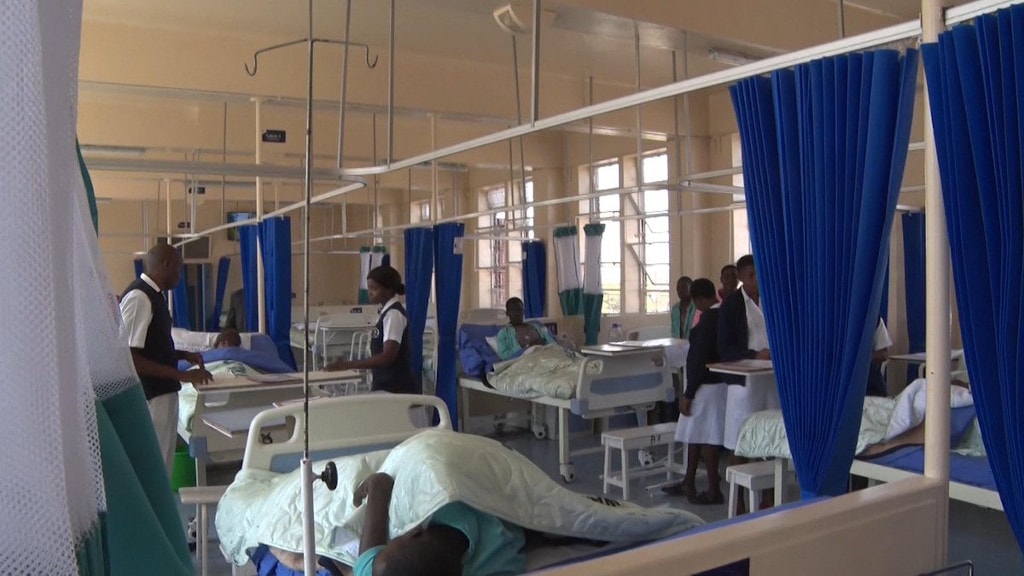
BY CAIPHAS CHIMHETE
Health facilities in Zimbabwe have been on a downward spiral following years of neglect and plunder of resources meant for their expansion, maintenance and upgrade.
Sally Mugabe Central Hospital, formerly Harare Hospital and commonly known as Gomo, has not been spared this destruction and currently lies in ruins, a piteous shadow of its former self.
The fall in stature and grace of this once regional star medical centre has not just been structural, but has pervaded the institution’s human fabric to a point where corruption has become a normal phenomenon and general morality now lies in irredeemable decay.
Below veteran journalist and health rights defender Caiphas Chimhete gives an eye witness account of his experience at this hospital during his recent admission there.
Ward B7 at Sally Mugabe Central Hospital in Harare is touted as the cleanest ward at the health institution, one of the largest referral centres in Zimbabwe, but what actually goes on behind the walls, away from public glare is a far cry from the gloss that this place is painted outside.
While the floors of the dormitory-like ward, perched at the third floor of the building, look spotless (much gratitude to the two ward cleaners), the actions and behaviour of the health workers particularly the nurses’ relations with patients, is abhorrent to say the least.
It would appear as if the health workers in this particular ward have never read the Patients’ Charter, which emphasises patients’ rights, privacy and confidentiality.
- Chamisa under fire over US$120K donation
- Mavhunga puts DeMbare into Chibuku quarterfinals
- Pension funds bet on Cabora Bassa oilfields
- Councils defy govt fire tender directive
Keep Reading
For most of the time during my three-week stay in the ward, they would call patients by the nature of their ailment — the most inhumane thing anyone can do to a sick person.
A very sick patient would be referred to as ‘chigulani’ [this invalid] or the one hospitalised for issues to do with dysfunctional reproductive organs spoken to as ‘uyo we siki anofunga kuti anopona asingadyi [that one suffering from a sexually transmitted disease thinks he can survive without eating] and they would also talk loudly about those who had multi-drug-resistant tuberculosis who were housed temporarily but “conveniently” at the back of the ward.
As a person that works for an organisation that advocates for people’s health rights, I tried to reason with them, but I was told to mind my business or else transfer to a private hospital.
In one incident, on a very cold evening there was this patient who had suffered a stroke on his left side, he spent the whole night calling on the nurses to cover him with blankets, but no one came.
They could hear him, but they never bothered to attend to him. I could have helped him, but I feared reprisals from the vindictive nurses.
A number of patients died during the time of my admission and I believe some of the deaths could have been avoided if patients were given professional health care.
Another patient, whom I had just spoken to, called for help as he wanted to be put back on oxygen, but no one came to assist.
He was gone in less than 15 minutes and was wheeled away to the mortuary with the nurses showing no remorse whatsoever.
During the day, the nurses on duty would either be glued on a small communal computer surfing for nursing vacancies outside the country or on their phones chatting with friends and relatives.
I remember one incident when one of the nurses had passed an English test taken by health workers wishing to migrate to the United Kingdom.
The euphoria that followed this development made it very difficult that day for patients to be attended to.
Calling for help on that day invited rebuke.
What really broke my heart was how they stole drugs from patients, presumably for resale to supplement their meagre incomes.
They would tell the patient that the drug he was taking was not available at the hospital pharmacy and they must buy it from outside.
Meanwhile, they would order the same drug from the pharmacy claiming they were giving the patient.
This happened to me and I complained to one of the doctors.
But the senior nurse in the ward, who was not present during the time one of the nurses claimed to have administered the drug to me, surprisingly leapt to the nurse’s defence.
Those patients, who complained were targets of humiliation.
They were either given little food or blood-stained and torn hospital garb — those that exposed the essentials, stripping the patient of privacy and dignity.
One patient refused to wear the hospital clothes labelling them marabu (rags).
One doctor advised me to keep it low and concentrate on getting my health restored.
I did, and I should hasten to say not all health workers are bad apples.
Many doctors are very nice and professional.
There were, however, very few qualified doctors and most of the diagnosis and treatment was done by student doctors without close supervision.
As a result, I had over 25 needle holes poked into my weak body as the inexperienced trainee doctors vainly searched for veins in my emaciated arms.
I also discovered that the nurses were using the cleaners to approach patients about to be discharged saying they would reduce their bills for a fee.
A bill of US$400 would be cut to about US$250 and a “token of appreciation” averaging US$40 would be paid to the cleaner, who would then share with nurses on duty that day.
If a patient rejected the deal, they would be presented with a huge bill, which could have been fictitiously generated to coerce the patient to agree to a cheaper alternative.
I could not establish if the huge bills were real or fake.
The hospital could be losing thousands of dollars through this chicanery.
I was also approached and offered this deal, but I declined.
Bills are generated in the ward from the services and drugs that a patient would have received and then taken to the accounts/finance department for verification and processing.
I was told that the thieving nurses worked closely with some unscrupulous officers in the accounts department.
For the over two weeks that I was hospitalised, I did not take a proper bath.
There was no running water at the hospital. Like other patients, I would wipe my body with a wet towel.
The cleaners would fill a drum-like plastic container with water from other wards from which patients would draw about a quarter of a bucket for bathing purposes.
As it was in June, the water was very cold.
Relatives and friends struggled to deliver water for drinking to their loved ones as entrance into the wards was restricted because of the upsurge in Covid-19 cases.
Some had to bribe their way in while others were turned away.
At one time, the single toilet was being used by at least 15 people exposing patients to contagious diseases.
The other ablutions compartment was closed as it was not working.
I was shocked that a health institution like Sally Mugabe Central Hospital had no reliable source of water and could go for weeks without the precious liquid in its wards.
The most affected wards are ones on the top floors.
The goings-on in Ward B7 could be a mirror of what goes on in other wards as disgruntled and underpaid nurses vent their anger and frustrations on patients.
They pilfer drugs to supplement their earnings.
The crumbling state of the hospital infrastructure, the shortage of medicines and lack of professionalism by the health workers at the hospital mirrors the state of the health situation in Zimbabwe.
Medicines are in short supply, the few health workers available are overworked and poorly remunerated leading to lack of motivation while the machines are antiquated.
Most hospitals and clinics in the country are now manned by student nurses and junior doctors as more experienced workers leave for better wages in the diaspora.
This has seriously compromised the quality of health care.
The government needs to urgently address the grievances of health workers — pay them well to ensure they are motivated.
More money should be allocated to the health sector from the national budget to enable the purchase of adequate medicines and the repair of essential equipment.
As I lay on what could have been my death-bed, I thought of what people often say: The worst place to be in Zimbabwe is in a hospital or the dingy prisons.
For me, the stay at Sally Mugabe Hospital was an unforgettable nightmare.
- Caiphas Chimhete is a Zimbabwean journalist based in Harare. He works for an NGO that takes up health issues of common concern and giving visibility to community processes on health in Zimbabwe.
- He writes in his personal capacity.









